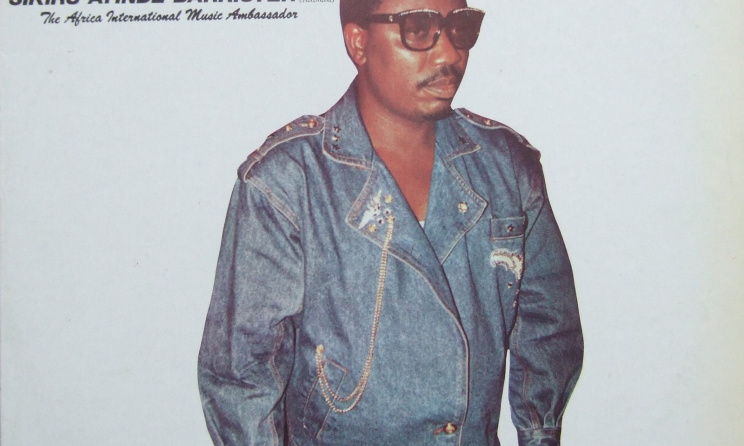Talking fuji music: Kollington, Barrister and KWAM 1
By Dare Dan
Perhaps unlike any other genre of indigenous music in Nigeria, fuji is a closely knit genre in style, rhythm and lyrical content. It is inseparable from the lives of the people in the South-Western region of Nigeria. This is likely why as other indigenous genres like juju and highlife die, fuji seems to grow stronger with many artists playing it and several more counting as fans.
 Saheed Osupa
Saheed Osupa Pasuma
Pasuma Barry Wonder album cover
Barry Wonder album cover KWAM 1
KWAM 1
Having spent most of my childhood in the Yoruba speaking region of the country, one night I found myself speaking of a genre which although, I am not a ‘die-hard’ fan of, I know about. My companions, Nigerians and a couple of Germans, had heard of fuji but they did not understand the art.
Without bothering myself on the historical events that shaped this genre of music or how the name ‘Fuji’ was arrived at in the first place, I launched into the times of Kolawole Ayinla aka Kollington and Sikiru Ayinde Barrister aka Barry Wonder. The two being the popular and fierce contenders to the post of ‘who’s the most prominent’ at the time (The idea of kingship came later-on with King Wasiu Ayinde). Before vulgarity and garish words of immorality was brought into Fuji by Obesere and before Pasuma’s quest to fuse hip-hop into the rich sounds of Fuji, these two (Barry Wonder and Kollinton) owned an epoch.
The contest became diabolical and physical that death and body injuries are recorded. Mostly, though, it was a war of words.
Season after season in the mid and late 90s, titles of records like ‘Lalakukulala’, ‘Ijo Yoyo’, ‘Fuji Garbage’, ‘Fuji Explosion’, ‘Fuji Ropopo’ and many more with jaw breaking Yoruba words that redefined the vocabulary would rock the air waves and send us dancing in the most awkward ways we had seen demonstrated on television.
‘Ijo Yoyo’, I remember, had you cross your palms in opposite directions and flap them as though illustrating the flight of a butterfly while the head jerk alongside the shoulders back and forth mechanically but rhythmically with flapping hands. Lalakukulala on the other hand would send legs opening and closing as wide as they could and the arms crossing over them in rhythm—these were weird times. One needed no more exercises after these movements that may go on for 20-45 minutes which is the average duration of a track. But these of course were not just about the dance but about abuses well-wrapped in parables to a rival.
Kollington was a veteran as was Barrister before his demise in December 2010. They joined the military during the Nigerian civil war in the 1960s. It was as though the war had continued on musical records with one responding to another’s insult passed in the his last record. Although I do not know when the rivalry started, I knew well when it was at its peak and when it died with the death of Barry Wonder from a protracted illness. He died December 2010 in London.
Sikiru Ayinla Barrister whom the majority of the fans regarded as the pioneer of fuji music and whose efforts and talents brought the genre into international limelight had started life from a very humble background. In one of his records, he had talked about how he hawked pepper for his mother after which he hustled as a bus conductor in Lagos and most times ate without beef, a discrepancy in some Nigerian dishes. Fuji music told stories of events in the society. Which is how it became a very important genre.
Sikiru started out singing to the Muslim folks during fasting period. He sang to rouse fellow Muslims for the very early morning meal. And maybe he discovered he had some influence and pushed. Barrister sang politics and morals in his music. He flavoured events with Yoruba proverbs and explored the richness of the language. The modernization of fuji music can also be credited to him having been the first fuji musician to tour the US, Europe and South America. He became very successful before his death and remains the preferred fuji musician amongst older people. But he had his own share of a bitter struggle with another influential Fuji musician of an earlier time.
Ekpo Akara who was highly loved in the 70s and 80s got wind of Young Sikiru and went after him. Ekpo Akara was later killed in a brawl and Barry had to flee. He fled to northern Nigeria, where he sang his innocence and found his way back into the hearts of the people.
Today, Barrister still stands out as the most successful Fuji Musician after King Wasiu Ayinde Marshal popularly known as KWAM 1. KWAM 1, who was formally a band member with Barrister broke away and started out with a first record that rocked the whole fuji world. He released ‘Talazo’ after which he had his own share of attacks from rivals. Everyone believed that the presumed spiritual attack that got him vomiting blood onstage once was the handiwork of Barrister, his former boss. Wasiu recovered afterwards but not without a glitch. With a voice that has lost its smoothness, Wasiu sang his way to enormous wealth and fame.
Today, Fuji Music is as strong as ever, with contentions amongst its players and fans just as fierce. Pasuma Wonder and King Saheed Osupa are on the radar now, each boasting fans numbering millions. Fuji artists still sing about happenings in the society, they still sing praises to the rich and of course still sing praises to themselves. Question is: Is there a way to harness fuji music’s past?























Comments
Log in or register to post comments